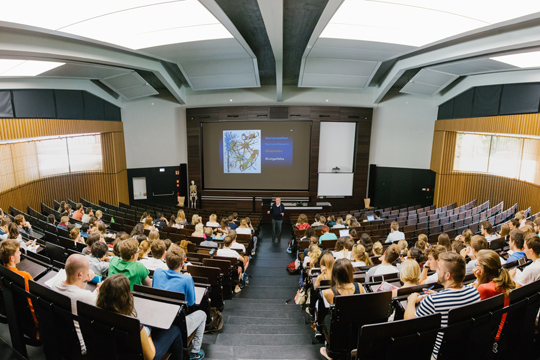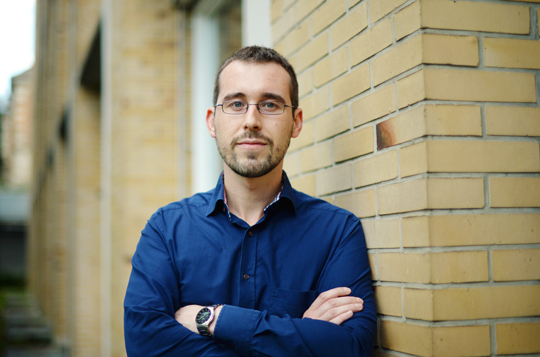The Flipped Classroom
Freiburg, Jan 29, 2019
The political scientist Ingo Henneberg wants to break up the format of classical lecture courses with e-learning seminars. They integrate the students more tightly – and the lectures and materials are available on line for anyone with interest in the topic.

Breaking up the format of the classical lecture with e-learning: The students are more tightly integrated and post their projects online. Foto: Sandra Meyndt
E-learning, learning supported by electronic media, sounds like it should be exciting. “Yet for a long time, it involved little more than material stored on a server that everyone could access and download,” says Ingo Henneberg, lecturer at the Department of Political Science. The University of Freiburg’s IT Services Department used to refer jokingly to this model as a “PDF spewer,” adds the peace and conflict researcher. He knows this because he spent a year taking courses from the so-called e-learning qualification program at the IT Services Department. The experience enabled him to develop a greatly extended approach to digitally networked teaching and learning that links students and teachers across Germany and even abroad. The approach earned him the University of Freiburg’s E-Learning Development Award in 2018.
“It was actually luck,” he recalls of the initial idea. It came to him in late 2015 at a peace and conflict research conference. At the time, the terror of the so-called Islamic State (IS) was omnipresent in the media. “We all considered it important to offer our students something on this issue.” One participant suggested organizing a joint course on the topic to pool expertise. Another researcher proposed chartering busses to bring students from all of the universities to the course.
Video Conference Instead of Busses
Henneberg was certain: “It could hardly work that way: first, because of the expenses involved – that’s always a problem for students,” and second, because he doubted whether the few, widely dispersed experts on IS would be able to agree on a time and place for the course. “Plus, we wanted to organize it fast to react to ongoing developments.”
The Freiburg political scientist therefore spontaneously suggested a digital approach as an alternative: “A kind of video conference, where the students sit at their respective universities and different experts are connected live each week.” This idea met with approval, and the cross-location lecture series on the terrorist organization IS/Daesh was held just half a year later, in the 2016 summer semester. Students from nine German universities took part. “It was the first time that a multitude of individual aspects on this topic were brought together to form an overall picture,” says Henneberg.

Important at the university and in the working world: The students in the e-learning seminars always work in teams. Foto: Vasyl/stock.adobe.com
From Digital Lecture Series to Seminar
The course garnered a lot of praise. Still, Henneberg and his colleagues were sure that the lecture series they had organized had even more potential, particularly with regard to the type of course: “Lecture courses are not exactly the most modern teaching format.” They wanted to get the students out of their role as passive listeners, to activate and integrate them more. To achieve this aim, Henneberg and his team planned their next e-learning project as a seminar series. The course title this time around was “A Threat to Peace in Europe?” The lesson plan encompassed topics like Brexit, the right-wing populist currents in many countries, and also current economic crises – such as that in Greece – and considered whether and how they could cause the European peace order to become unhinged. Five further universities in Germany took part, and researchers from different research institutes in Europe and Canada provided the content. The seminar was designed according to the didactic model of the flipped classroom. This model involves hardly any frontal instruction, which becomes exhausting for students after a certain period of time. Instead, they themselves help to design the course, in the process of which they quickly gauge their understanding of the material.
“We started by asking the experts for video lectures, short introductory talks of about 20 minutes duration,” explains Henneberg. “And these lectures were made available to the students before the seminar even began.” They served as a means of preparing for the course – as did the electronic dossiers the course participants from all universities then created in groups for the class sessions. This freed up valuable class time for in-depth discussions. The students had an active role here too: as moderators whose job was to ask the experts the first questions to get the discussion underway.
Digital Tools: Online Forums and Messaging Platforms
The extent of organization involved in holding the course is great, says Henneberg: “A discussion via video conference between an expert at one university and students at six others requires quite a bit of coordination.” A lot of digital tools were used in the process: The students coordinated their work via online forums, messaging platforms, and Skype. An organization team consisting of seven people from six universities and their assistants wrote handbooks to help the students put together their electronic dossiers. Later on in the video seminars, they used the digital educational tool Tweedback to make sure everyone got their fair share of discussion time. On this point, Henneberg emphasizes the great support the team received from Freiburg’s IT Services Department, especially from the E-Learning Service Center: “Without this help, it simply would not have been feasible to realize such a complex project.”

The idea of a new e-learning approach came to Ingo Henneberg in late 2015 at a peace and conflict research conference.. Photo: Patrick Seeger
The political scientist could tell how enthusiastic the students were about his concept even just from the seminar projects they submitted. “Some of them left us absolutely speechless. They were of a quality we really hadn’t reckoned with.” The approaches the students took were not just academic but also journalistic: street surveys, interviews, even radio features. One group even received the Media Prize of the State of North Rhine-Westphalia for their project on right-wing populism.
Practically Limitless
This is something completely different from a normal term paper that only the teacher of the course reads, finds Henneberg: “The students present their work to the digital community, which is practically limitless.” The seminar is now available on the internet: Anyone who is interested can access the lectures and materials. “The way I see it, this is the function of a university,” comments the political scientist: “Rather than generating their knowledge behind closed doors, they should be making it available for the good of society.”
After so many positive experiences, the next digital seminar series began in the 2018 summer semester. This time the focus was on the relations between security, development, and migration, as exemplified by the situation in Africa: “My students are editing it for the internet at the moment.” Eight universities participated in the new course – a bit too many in Henneberg’s opinion: Things get too complicated, and the technical resources run up against their limits. Six partners is a good size – large enough to make an impression on experts: “If one university requests a lecture, the expert might or might not accept. If an entire group of universities makes the request, they’ll have much better chances.”
The Freiburg political scientist does not think that his e-learning concept should become the new standard: The classical seminar still has its rightful place, but the e-learning model could be a very interesting complement and addition to it. “I’m optimistic that we’ll be seeing instructional approaches like this more often in the future.”
Mathias Heybrock
E-Learning project “Gefährdung des Friedens in Europa?” (only German)

